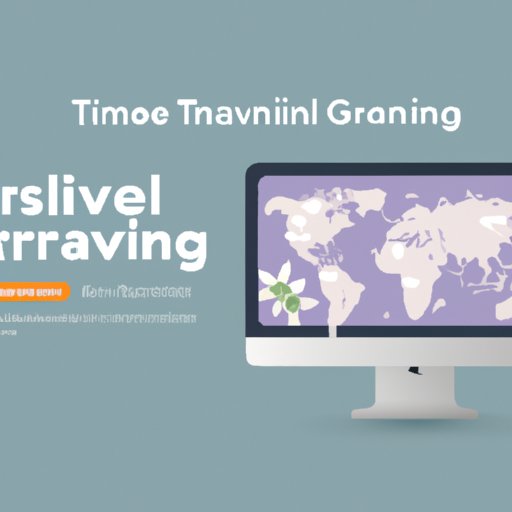Introduction
Are you considering opening a travel agency business in California? Becoming an entrepreneur in the travel industry can be rewarding and financially lucrative if done properly. This article provides an overview of what it takes to get started and offers guidance on navigating the various regulations, finding sources of funding, developing a business plan, researching the local market and competitors, and creating an online presence.

Regulations and Licenses Required to Start a Travel Agency Business in California
Before you launch your business, there are certain regulations and licensing requirements that must be met. These vary depending on the type of services you plan to offer, as well as the state you are operating in.
Obtaining State Licensing
In California, travel agencies are required to obtain a Seller of Travel (SOT) license from the Attorney General’s Office. This license is for any business that sells or arranges travel packages or services within the state. To qualify for the SOT license, applicants must meet certain criteria, such as having a permanent place of business in California and being able to prove financial responsibility with a bond or surety deposit.
Understanding Federal Requirements
In addition to state licensing requirements, travel agencies must also comply with federal regulations. This includes registering with the U.S. Department of Transportation (DOT), obtaining an International Air Transport Association (IATA) number, and becoming a member of the Airlines Reporting Corporation (ARC). All of these steps are necessary to ensure that your business is legally compliant and can sell airline tickets.

Potential Sources of Funding for Your New Travel Agency Business
Once you have secured all of the necessary licenses and registrations, you can begin exploring different funding options for your new business. Depending on your needs, there are several potential sources of funding available, such as bank loans, small business grants, and crowdfunding opportunities.
Bank Loans
If you need additional capital to start your business, you may want to consider applying for a bank loan. Banks typically require collateral, such as personal assets or real estate, to secure the loan. Additionally, they tend to have strict eligibility requirements and long approval processes.
Small Business Grants
Another option is to apply for a small business grant. These are typically awarded by government or nonprofit organizations to businesses that meet certain criteria. The application process for grants is often lengthy and competitive, but if you are successful, you can receive a substantial amount of money to help get your business off the ground.
Crowdfunding Opportunities
Crowdfunding is another potential source of funding for your travel agency business. With crowdfunding, you can solicit donations from individuals or organizations to help cover start-up costs. Popular crowdfunding platforms include Kickstarter and GoFundMe.
Developing an Effective Business Plan for Your California-Based Travel Agency
Creating a business plan is an essential step in launching your travel agency. A business plan should outline your goals and objectives, detail your marketing strategy, and establish financial projections. It should also include an analysis of the local travel industry and an assessment of your target market and competition.
Identifying Goals and Objectives
The first step in creating a business plan is to identify your goals and objectives. Consider what you want to achieve with your business, both short-term and long-term. Examples of goals and objectives could include increasing revenue by 10% within the first year, expanding to other cities within three years, or becoming the top travel agency in the area.
Developing a Marketing Strategy
Once you have identified your goals and objectives, you can begin developing a marketing strategy. This should include a comprehensive plan for how you will promote and advertise your business. You may want to consider digital marketing tactics, such as search engine optimization (SEO), social media campaigns, email newsletters, and pay-per-click (PPC) advertising.
Establishing Financial Projections
Finally, you should create financial projections for your business. This will help you better understand the financial implications of launching your travel agency and determine whether or not it is a viable endeavor. Make sure to include estimated expenses, projected income, and expected profits.
Researching the Local Market and Competitors
Before you open your business, it is important to do thorough research on the local market and your competitors. This will give you a better understanding of the travel industry in your area and provide insight into how you can differentiate your business.
Analyzing the Local Travel Industry
Start by analyzing the overall travel industry in your area. Research trends in the market, such as the types of services that are in demand and the pricing structures of competitors. This will help you develop a more informed business strategy.
Identifying Your Target Market
Once you have a better understanding of the local travel industry, you can begin identifying your target market. Consider who your ideal customer is and what their needs are. This will help you tailor your services and marketing efforts to reach the right people.
Assessing Your Competition
Finally, take some time to assess your competition. Analyze their services, prices, and marketing strategies. This will give you a better understanding of the local market and help you determine how you can stand out from the crowd.
Considering Different Types of Travel Services You Can Offer
When starting a travel agency business, you will need to decide what types of services you are going to offer. Common services include flight booking, hotel reservations, cruises, and tour packages. Consider what makes sense for your business and what will best serve your target market.
Flight Booking
Flight booking is one of the most popular services offered by travel agencies. It involves helping customers find the best deals on flights and making reservations on their behalf. As a travel agency, you can work with airlines directly or through third-party booking sites.
Hotel Reservations
In addition to flight booking, you can also offer hotel reservations. This involves helping customers find the best deals on hotels and making reservations on their behalf. You can work with individual hotels or with third-party booking sites.
Cruises
Cruises are another popular service offered by travel agencies. This involves helping customers choose the best cruise line, ship, and itinerary for their needs. As a travel agent, you can work with cruise lines directly or through third-party booking sites.
Tour Packages
You can also offer tour packages, which involve creating customized itineraries for customers. This could include booking flights, hotels, and activities, as well as arranging transportation and providing local guides. Tour packages are a great way to offer a unique experience to customers.

Creating an Online Presence for Your Travel Agency Business
Once you have established your services and chosen your target market, you can begin creating an online presence for your business. Setting up a website and building your social media platforms are key components of any digital marketing strategy.
Setting Up a Website
The first step is to set up a website for your business. This should include information about your services, contact details, and payment options. You may also want to consider adding a blog to your website, as this can help boost your SEO rankings and draw more traffic to your site.
Building Your Social Media Platforms
Next, you can begin building your social media presence. Choose the platforms that make the most sense for your business and start posting content regularly. You may also want to consider running paid advertising campaigns to reach a larger audience.
Utilizing Digital Marketing Strategies
Finally, consider utilizing other digital marketing strategies, such as email newsletters and influencer marketing. Email newsletters can help keep your customers informed and build relationships, while influencer marketing can help spread the word about your business.
Conclusion
Starting a travel agency business in California requires careful planning and research. You must meet certain regulations and licensing requirements, find sources of funding, develop an effective business plan, research the local market and competitors, and create an online presence. By following these steps, you can successfully launch your travel agency business and begin offering services to customers.
(Note: Is this article not meeting your expectations? Do you have knowledge or insights to share? Unlock new opportunities and expand your reach by joining our authors team. Click Registration to join us and share your expertise with our readers.)
